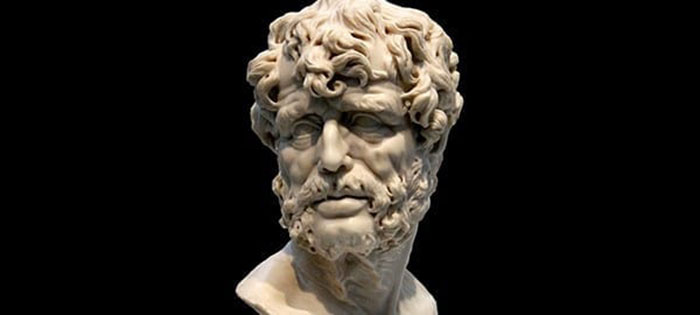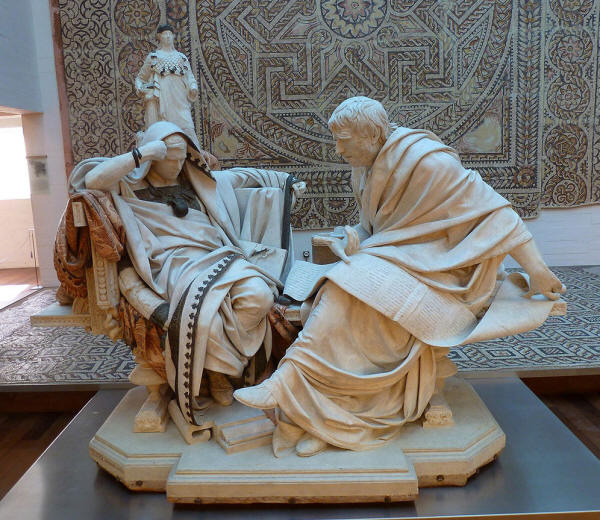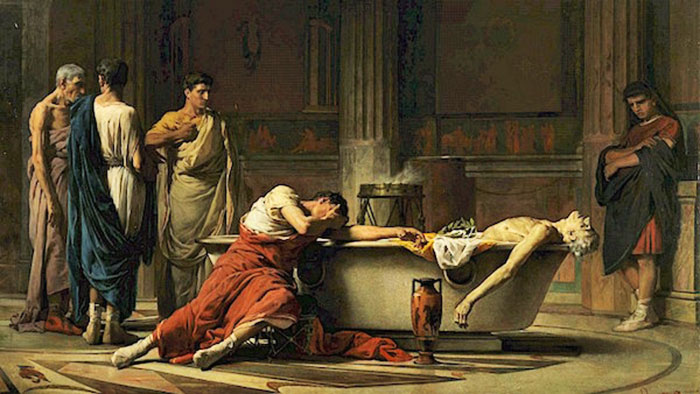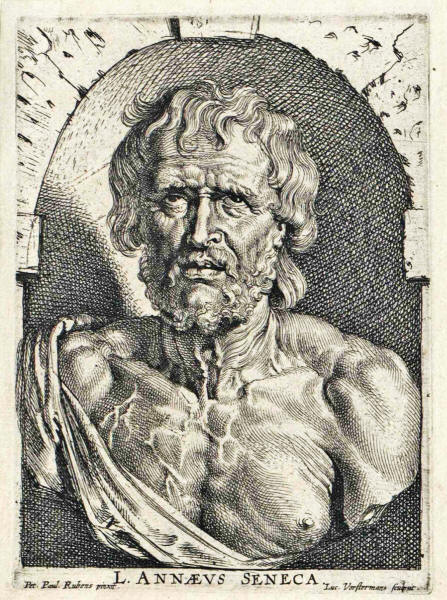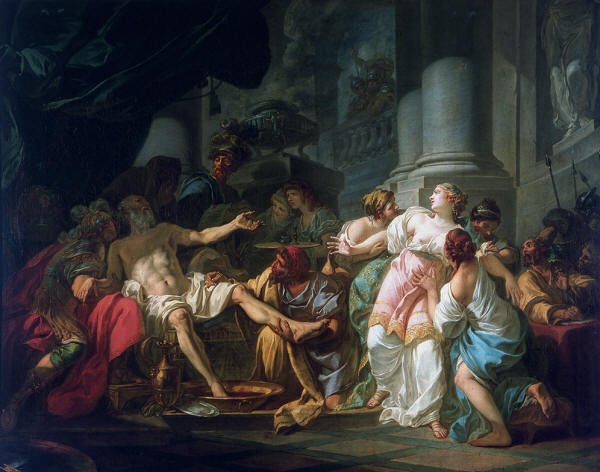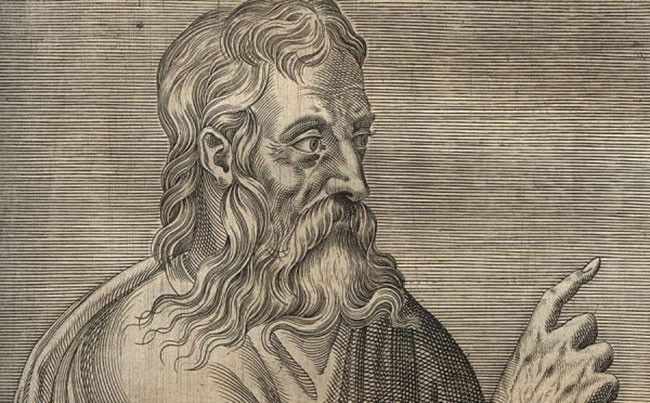|
June 19, 2020 from ClassicalWisdom Website
However, the Ancient World was witness to the suicide sentence of another great philosopher:
456 years after Socrates' death, Emperor Nero ordered his aged tutor and advisor, Lucius Annaeus Seneca, to take his own life.
Nero and Seneca, by Eduardo Barrón (1904). Museo del Prado
Seneca had been accused of complicity in the Pisonian conspiracy to assassinate Nero, though he was most likely innocent.
According to Tacitus's account (Annals 15.61), when the news of the Emperor's orders reached Seneca, he,
After these and some similar remarks, Seneca embraced his wife, relieved her sorrows, and asked her not to grieve excessively.
But Pompeia Paulina, determined to share her husband's fate, had already resolved to die by his side.
Woodcut illustration of the suicide of Seneca and the attempted suicide of his wife Pompeia Paulina
They severed the veins on their arms, but Seneca's aged body, emaciated further by his frugal diet, bled too slowly.
He then cut the arteries in his legs and knees, hoping this would give escape to the stiffened blood. With all his attempts unsuccessful, Seneca asked his wife to withdraw into another room, for she was already tormented enough by her wounds to witness the agonizing struggles of her exhausted husband.
However, with or without her knowledge, Pompeia was saved on Nero's orders, and she made no more efforts to take her life. Seneca, in the meantime, dictated his last discourse to the scribes and asked his close friend to prepare the poison - a method provided in the old days of Athens.
When even the poison did not aid his protracted death, Seneca submerged himself in a bath filled with heated water and at last, departed this life.
...these are the words he wrote and lived by to the very end. This episode of Seneca's life is significant not only by its impressive and memorable acts but also because it is an illustrious manifestation of his philosophical convictions and fundamental values.
Judge it for yourself...
Manuel Domínguez Sánchez, The suicide of Seneca (1871), Museo del Prado
Out of the three main philosophers of Roman Stoicism - Seneca, Epictetus, and Marcus Aurelius - Seneca was the only one who wrote in Latin.
And, what is more, he could be justifiably regarded as the single most important figure of the Stoic tradition.
Therefore, Seneca often remarks in various ways that the highest good is to live according to Nature.
Seneca by Vorsterman, Lucas. Datierung: 1610 / 1675
Everything that happens originates from necessity and is an inviolable component of the order woven into the chain of causes.
Seneca believed that the dread of the imminent end should be surmounted through the practice of "Memento Mori" - consistent meditation on death.
Reflecting on our mortality and anticipating the soul's release from bodily captivity liberates us from the fear of death.
And what other fears could take hold of one who was overcome the dread of death itself? In his work De Tranquillitate Animi, Seneca illustrates his reasoning with a memorable story:
In deep water… a detail from the Death of Seneca by Rubens. Photograph: Gianni Dagli Orti/ Gianni Dagli Orti/Corbis. Source: The Guardian.
With all this in mind, it should come as no surprise that Seneca attempted to relieve a grieving mother who lost her son not by offering traditional consolations, but by prompting her to reflect on the nature of death:
To lose a son is surely a tragedy beyond the grasp of words, but in a world laden with unforeseen catastrophes and premature deaths, is it wise to count ourselves among the safe and invulnerable?
Yet we cling onto this shortsighted mindset,
La morte di Seneca, olio su tela, Musée du Petit-Palais, Parigi
Always expect the worst, Seneca tells us, for if Fortune determines it to be, so it will, and when the misery finally befalls us, it will not catch us heedless and unaware.
We cannot control the necessity-stirred network of events, say the Stoics, since we are bound to come to naught against the reign of Fortune.
Yet, we can, and we ought to, become the masters of ourselves. Our minds are constituted by the same rational principle that governs the universe; therefore, we are rational beings in essence, and with the power of rational judgment - the only power we truly possess - we can take control over our emotional responses and state of mind.
In a word, not the course of events, but our relation and approach to these events are up to us to choose.
Portrait of Seneca The Younger. Source: Getty Images.
Once you acknowledge calmly that fate is out of your reach and focus instead on making the best use of what is within your control, you are no longer a desperate pawn but a willful participant of this superior game of Fortune.
By understanding the limits of our power, we become free, and by practicing the rational restraints of self-discipline, we become masters of ourselves:
Lucius Annaeus Seneca is not a philosopher one should only read to discover sophisticated answers or to be intellectually stimulated.
Among other things, what makes his texts of undying value is the flame of solace and encouragement they ignite.
But not a single word of his appeases us or fills our hearts with relief:
If so, how do they still give us strength?
They do so because we know, we no longer roam blindfolded. We stand firm, in harmony with ourselves and the universe. Seneca's words do not soothe - they arm.
Picture your greatest fears - he says - picture, and make yourself home with them, so you know that if the ordeal comes, you will survive it.
And this is exactly what we need to understand:
The key is to realize this before it is too late.
|


